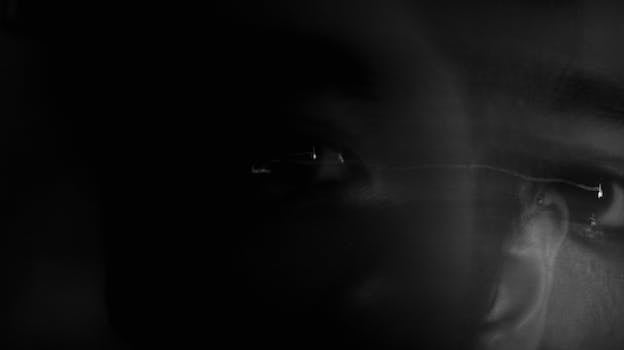-
Table of Contents
“The White Gaze: Unveiling the Perception of Black Horror”
Introduction
The concept of the “White Gaze” refers to the perspective and perception of white individuals towards people of color, particularly Black individuals. In the context of horror, the White Gaze often influences the portrayal and reception of Black horror characters and narratives. This introduction explores how the White Gaze shapes the perception of Black horror, highlighting the implications and consequences of this dynamic.
The Impact of the White Gaze on Black Horror Films
The Impact of the White Gaze on Black Horror Films
In recent years, there has been a surge in the popularity of horror films that center around black characters and themes. These films, often referred to as “black horror,” have provided a platform for black filmmakers and actors to tell their stories and explore their experiences through the lens of the horror genre. However, despite the progress made in diversifying the horror genre, the white gaze continues to have a significant impact on the perception and reception of these films.
The white gaze refers to the perspective and expectations of white audiences and critics when viewing and analyzing black art. It is a lens through which black horror films are often filtered, leading to a distorted understanding and appreciation of the genre. This can manifest in various ways, from the misinterpretation of cultural references to the dismissal of the unique experiences and fears explored in these films.
One of the most common ways in which the white gaze affects the perception of black horror is through the expectation of a white protagonist or a white savior figure. This expectation stems from the dominance of white characters in mainstream horror films and the assumption that white audiences will only relate to and invest in stories that center around white experiences. As a result, black horror films that deviate from this norm are often met with skepticism and resistance.
Another way in which the white gaze impacts black horror is through the tendency to exoticize and fetishize black culture and experiences. Black horror films often draw on African folklore, spirituality, and history to create a unique and authentic narrative. However, the white gaze can reduce these elements to mere spectacle, failing to appreciate the depth and significance they hold for black audiences. This can lead to a shallow understanding of the film’s themes and a perpetuation of harmful stereotypes.
Furthermore, the white gaze can also influence the marketing and distribution of black horror films. Studios and distributors may prioritize white audiences and downplay the cultural significance of these films in order to make them more palatable to a wider audience. This can result in the erasure of the film’s blackness and the dilution of its intended impact. It also limits the opportunities for black filmmakers and actors to reach a broader audience and gain recognition for their work.
Despite these challenges, black horror films have managed to carve out a space for themselves within the genre. Filmmakers like Jordan Peele, who directed the critically acclaimed films “Get Out” and “Us,” have been instrumental in challenging the white gaze and redefining the possibilities of black horror. These films have not only been commercially successful but have also sparked important conversations about race, identity, and social issues.
In conclusion, the white gaze continues to have a significant impact on the perception and reception of black horror films. It influences the expectations, interpretations, and distribution of these films, often leading to a distorted understanding of their themes and cultural significance. However, black filmmakers and actors have been pushing back against these limitations, creating thought-provoking and groundbreaking works that challenge the status quo. As the genre continues to evolve, it is crucial to recognize and dismantle the white gaze in order to fully appreciate and support the diverse voices and stories within black horror.
Challenging the White Gaze: Reclaiming Black Horror Narratives

The White Gaze and the Perception of Black Horror
In recent years, there has been a growing recognition of the importance of diverse voices in the horror genre. However, despite this progress, there still exists a pervasive influence of the white gaze in the perception and portrayal of black horror narratives. The white gaze refers to the dominant perspective of white culture that shapes and influences how black stories are told and consumed. This article aims to explore the impact of the white gaze on the perception of black horror and the importance of reclaiming these narratives.
One of the key issues with the white gaze is its tendency to perpetuate harmful stereotypes and tropes about black characters in horror. For far too long, black characters have been relegated to the role of the sacrificial lamb or the comedic relief, reinforcing the notion that their lives are expendable or that their experiences are not to be taken seriously. This not only diminishes the complexity and depth of black characters but also perpetuates harmful stereotypes that have real-world consequences.
Furthermore, the white gaze often fails to recognize the unique cultural and historical context of black horror narratives. Black horror is deeply rooted in the experiences of the African diaspora, drawing upon themes of slavery, racism, and the ongoing struggle for equality. By ignoring or downplaying these aspects, the white gaze erases the rich cultural heritage that informs black horror and reduces it to mere entertainment.
Reclaiming black horror narratives is crucial in challenging the white gaze and providing a platform for authentic and diverse storytelling. Black creators have been at the forefront of this movement, using their voices and talents to subvert traditional horror tropes and reclaim their narratives. By centering black characters as complex and multidimensional protagonists, these narratives challenge the notion that black lives are disposable or that their experiences are secondary.
Moreover, reclaiming black horror narratives allows for a more nuanced exploration of the fears and anxieties specific to the black community. By addressing the historical traumas and systemic injustices that continue to plague black lives, these narratives provide a space for catharsis and healing. They offer a means of confronting and processing the horrors of the past and present, while also envisioning a future where black voices are heard and valued.
In recent years, there have been notable examples of black horror films and literature that have successfully challenged the white gaze. Films like “Get Out” and “Us” directed by Jordan Peele have garnered critical acclaim and commercial success, demonstrating the demand for diverse and authentic storytelling. These films not only provide a fresh perspective on the horror genre but also serve as a catalyst for conversations about race and representation in mainstream media.
In conclusion, the white gaze continues to shape the perception of black horror narratives, perpetuating harmful stereotypes and erasing the unique cultural context of these stories. However, the movement to reclaim black horror narratives is gaining momentum, with black creators at the forefront of this transformative shift. By challenging traditional tropes and centering black voices, these narratives offer a powerful means of confronting and subverting the white gaze. It is through these efforts that we can hope to create a more inclusive and representative horror genre that reflects the diverse experiences and perspectives of all people.
Analyzing the Perception of Black Horror through the Lens of the White Gaze
The perception of Black horror through the lens of the white gaze is a complex and multifaceted issue that requires careful analysis. The white gaze refers to the perspective and perception of white individuals, which often shapes and influences how Black horror is understood and interpreted. This article aims to delve into this topic, exploring the ways in which the white gaze impacts the perception of Black horror.
One of the key aspects of the white gaze is the tendency to view Black horror through a lens of otherness and exoticism. Black horror often incorporates elements of African folklore, spirituality, and cultural traditions, which can be unfamiliar to white audiences. As a result, the white gaze may exoticize and sensationalize these aspects, reducing them to mere spectacle rather than appreciating their cultural significance. This can perpetuate harmful stereotypes and reinforce the notion that Black horror is inherently strange or abnormal.
Furthermore, the white gaze often fails to recognize the historical and social context in which Black horror narratives are situated. Black horror frequently explores themes of racial oppression, systemic racism, and the African diaspora experience. However, the white gaze may overlook or downplay these themes, instead focusing on surface-level scares and entertainment value. This not only diminishes the depth and complexity of Black horror but also perpetuates a limited understanding of the genre.
Another aspect of the white gaze is the tendency to center white characters and perspectives in Black horror narratives. This can be seen in films where white protagonists are positioned as the saviors or heroes, while Black characters are relegated to supporting roles or victims. By centering white experiences, the white gaze diminishes the agency and importance of Black characters, reinforcing a narrative that prioritizes white perspectives and erases the lived experiences of Black individuals.
Moreover, the white gaze often imposes its own expectations and standards onto Black horror, shaping what is considered acceptable or marketable. This can lead to the erasure or marginalization of Black voices and narratives that do not conform to white expectations. As a result, Black horror creators may feel pressured to conform to white standards in order to gain recognition and success, further perpetuating the dominance of the white gaze in the genre.
To challenge the white gaze and promote a more inclusive and nuanced perception of Black horror, it is crucial to amplify Black voices and perspectives. This can be achieved by supporting and promoting the work of Black horror creators, both in mainstream media and independent platforms. By centering Black narratives and experiences, we can begin to dismantle the white gaze and create space for diverse and authentic representations of Black horror.
In conclusion, the perception of Black horror through the lens of the white gaze is a complex issue that requires critical examination. The white gaze often exoticizes, overlooks historical context, centers white perspectives, and imposes its own expectations onto Black horror narratives. To challenge this, it is essential to amplify Black voices and narratives, promoting a more inclusive and nuanced understanding of the genre. By doing so, we can begin to dismantle the white gaze and foster a more equitable and diverse landscape for Black horror.
Q&A
1. What is the concept of “The White Gaze” in relation to the perception of Black horror?
The concept of “The White Gaze” refers to the perspective and perception of Black horror through the lens of white individuals or dominant white culture.
2. How does “The White Gaze” influence the perception of Black horror?
“The White Gaze” often leads to the exoticization, othering, and dehumanization of Black characters and narratives within the horror genre. It can perpetuate harmful stereotypes and limit authentic representation.
3. What are the implications of “The White Gaze” on the portrayal of Black horror?
“The White Gaze” can result in the erasure or misrepresentation of Black experiences and perspectives within the horror genre. It can reinforce power imbalances and hinder the exploration of diverse narratives and themes.
Conclusion
The concept of the White Gaze refers to the perspective and perception of white individuals towards people of color, particularly Black individuals. In the context of Black horror, the White Gaze plays a significant role in shaping the portrayal and reception of Black horror narratives. It often perpetuates harmful stereotypes and reinforces racial biases, leading to the marginalization and misrepresentation of Black characters and their experiences. The White Gaze in the perception of Black horror needs to be critically examined and challenged in order to promote more authentic and diverse representations in the genre.

